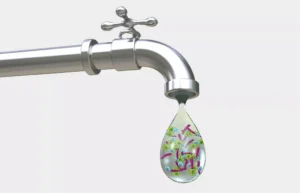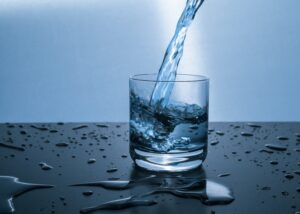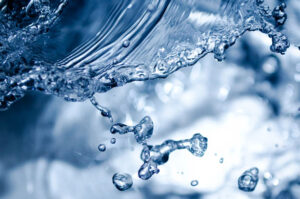
I have recently become curious about the purity of bottled water. My wife prefers spring water, while I like distilled water. Most people I know have one particular brand of bottled water that they like the most, while claiming that other water tastes bad. They also usually believe that tap water tastes very bad and is less clean than bottled water. But could these people really distinguish tap water from bottled water if they were blindfolded? And more importantly, is bottled water cleaner or safer to drink than tap water? The answer to both questions is no.
This blog will not discuss the health effects of drinking water bottled in plastic, as I already discussed that in my blog about BPA in plastic bottles. I will also not discuss whether or not producing bottle water results in a significant waste of resources and energy. This blog will only discuss how clean bottled water really is and the differences between brands. It is difficult to find scholarly articles analyzing various bottled water brands, so for this blog, I will mostly use the websites of water brands for information.
Various types of bottled water
What constitutes bottled water? The term bottled water is very narrowly applied, and if the bottle label says “water,” “carbonated water,” “seltzer water,” filtered water,” “sparkling water,” or “disinfected water,” the FDA does not consider this bottled water, and they are thus exempt from any regulations enforced on bottled water (they only consider it bottled water if labeled “bottled water.”). No testing whatsoever is required for these beverages, and the only mention of regulations is that the water cannot be “adulterated,” but no legal definition is given for this term.
Carbonated water, flavored water, soda water, sparkling water, and tonic water are classified as food items by the FDA (I could not find information about the regulation of food items). Any water that flows unaided to the surface can be called spring water, even if it is located in the middle of a city or a dump (1). Do not assume that your spring water has come from the pristine mountains that you see on bottles; it may very likely come from a city.
I came across a very thorough paper all about bottled water by a reputable organization called NRCD, which has performed the most independent analyses of bottled water in the country. As this organization is listened to by the FDA and is very reliable, I will take most of this blog from their paper, which is dozens of pages long. I will highlight what I find to be the most interesting and informative parts of their paper.
Regulation of bottled water
Regulation of bottled water tends to be less strict than regulation of tap water. Surprisingly, the FDA (food and drug administration) is only responsible for regulating water that passes state lines, called interstate commerce, even though about 60–70% of the bottled water sold in this country is intrastate, meaning it never crosses state lines and is thus outside the scope of FDA regulation. This creates a situation where we must rely on the voluntary testing of water by the water companies as states have few resources to devote to regulating bottled drinking water.
Tap water, at least in large cities, is strictly regulated and regularly tested, with the test results being made public soon after. Bottle water contaminations in the past have mostly been dealt with silently without much public awareness.
Tap water vs. bottled water testing requirements
Testing is much more lenient in bottled water than in tap water. The FDA requires large city tap water to be tested at least 100 times monthly for certain bacteria, while bottled water companies only have to test once a week. Bacterial violations in water are much stricter in tap water, as the FDA counts HPC bacteria towards tap water bacterial violations but ignores the HPC bacteria when it is found in bottled water.
The FDA requires tap water companies to test for certain viruses and bacteria when taking surface water from lakes or rivers, yet it does not apply this standard to bottled water companies. Even testing for chemicals like pesticides is required four times a year for tap water but once a year for bottled water. Other potentially very dangerous contaminants, like asbestos, must be tested for in tap water, but bottled water companies do not have to do so. Every year, tap water companies are legally required to provide a Consumer Confidence Report that lists the results of contamination testing, while bottled water companies are not and often sweep any contamination issues under the rug.
Bottled tap water
Two of the three highest-selling bottled water brands are actually refined tap water. These two brands are Aquafina, owned by Pepsi, and Dasani, which is owned by Coke. If you go and read their website, they will describe an elaborate process that the water goes through to further purify it. Dasani uses reverse osmosis, while Aquafina uses reverse osmosis and “other” filtering and purifying methods, which they do not elaborate on. I learned from my research on chemicals in tap water that tap water in the US is very rigorously purified. The water that comes through your faucet is held to stricter quality standards than bottled water and is tested much more frequently.
So, is reverse osmosis filtration anything special? Well, it is very effective at removing contaminants from water. It pushes particles across a membrane, which removes 99% of dissolved solids, bacteria, and chemicals and can remove unwanted odors, colors, and tastes from water. Obviously, this method is effective, but is it anything above and beyond what tap water filtration plants already perform? At the end of the day, reverse osmosis is just a fancy name for filtration, which is similar to the various steps of filtration that tap water goes through. The only upside I can see for buying filtered tap water is that it may taste better than tap water. Even this is debatable, however.
It is difficult to report on individual water brands as there are hundreds of them, and a large majority are never tested. Almost all bottled water is clean and more than suitable for drinking, but sometimes it is contaminated, and stricter regulations are needed. If we do not strictly test each brand, we cannot just assume that they are all safe. I made this blog to call into question the idea that bottled water is safer than tap water since this is a very important issue as most people choose bottled water for perceived health benefits.
Remember, between 25 and 40% of bottled waters are taken from tap water, with some companies performing no additional filtration of this water.
Does bottled water taste better?
Taste is one of the top reasons why people choose bottled water. But can people really tell the difference? A non-scientific ABC poll gave a studio audience one of four types of water: NYC tap water, Poland spring, oxygenated water, and evian. Surprisingly, 45% of the audience rated the NYC tap water as the best tasting, followed by Poland Spring, oxygenated water, and Evian. The general consensus is that people usually cannot tell the differences between waters unless they know what they are drinking before hand.
The Penn and Teller show did their own blind taste studies and found that 75% of New Yorkers preferred tap water to bottled water. At Boston University, 67 students taste-tested tap water from various school buildings and seven bottled water brands and were asked to choose the ones that were tap water. Only 1/3 of the students picked the tap water cups correctly, while another 1/3 thought the bottled water was tap water, and the remaining subjects could not tell the difference. Obviously, we make up our minds about the taste before we even sip the water.
Discussion
Hopefully, I have shown that tap water is just as clean, if not cleaner, than bottled water. I am not against drinking bottled water; I just wanted to address some of the misconceptions about both bottled water and tap water. Undoubtedly, tap water from different regions may have a more metallic or chemical taste than others. Maybe you live in one of these areas. In these cases, it would make sense to drink bottled water for taste. But if you can’t actually tell the difference between tap water and bottled water, maybe you should drink both and save some money (not enough to buy a car, but maybe a cup of coffee a month).
This blog was about bottled water, so I will say one last thing about tap water. Tap water goes through various filters and disinfectants and is held to very high standards of purity by the EPA. Bottled water, for the most part, is not subject to these strict regulations. Most people can’t even tell the difference between the two water types based on their blind tastes. If you are bored one day, you should have a friend give you samples of various bottled waters and tap water without telling you which is which and see if you can tell the difference. If you are like most people, you will not be able to distinguish them.
At the end of the day, we are creatures of habit, and this often goes against logic. You probably already have a favorite brand of bottled water and have bottled water brands that you do not like. You probably also think tap water tastes noticeably bad. If you are like most people, myself included, you will continue to only drink your bottled water of choice and avoid tap water (although I use tap water for tea and soups). So be it; even if you don’t want to drink tap water, at least don’t fear it!
Sources





More than 80% of diseases in little kids (under 5 years) are associated to water quality. Here we need to have the option of bottled water, we can’t drink directly from our “tap” (unless you want to die).
I will try to see in we have a detailed information in our options at supermarket. Nice reading you again!
Hey Bernal. I remember trying to find distilled water in Guatemala. I had no luck. They seem to only carry one brand which is filtered tap water. Most child deaths result from diarrhea induced by bacteria in unsafe drinking water…this is a huge problem in countries like India where clean water is hard to come by and they end up drinking dirty river water to survive. Makes you appreciate living in a country that has enough drinking water for everyone. But it is a shame that other less developed countries have that problem. I am not sure of the solution though unless they find really effective and cheap purifying methods that these countries can use. Thanks for the comment!
I personally enjoyed really much reading this blog… as you know I love my spring water.
I think I would like to do the experiment you mentioned. Try different types of water to see if I can tell the difference.
I do not like certain brands of water.
Even after reading this article I will have more peace of mind drinking bottle water than tap water. But if you give me a glass of water from the tap I will drink it as well.
I am curious how the water experiment will conclude.